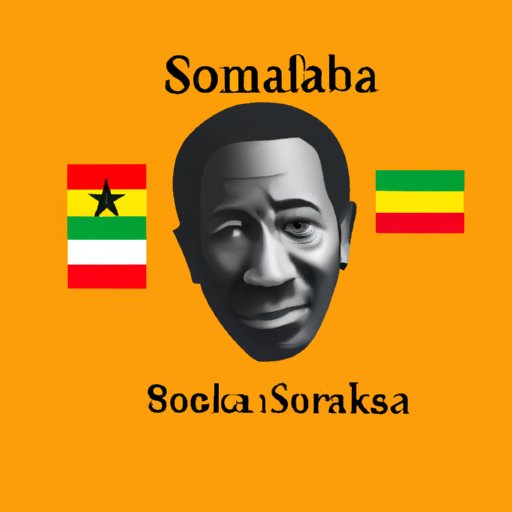Introduction
Thomas Sankara was an iconic African leader whose brief tenure as the President of Burkina Faso in the 1980s left an indelible mark on the nation and the continent as a whole. He is often referred to as the “Che Guevara of Africa” for his revolutionary spirit and commitment to social justice and economic independence. But was he a good leader? This article seeks to explore this question by examining his biography, economic and social policies, and lasting legacy.
Biography of Thomas Sankara
Thomas Isidore Noël Sankara was born on December 21, 1949 in Yako, French Upper Volta (now Burkina Faso). He attended military school in Madagascar and later joined the Burkinabé army, becoming one of the youngest captains in the history of the Burkinabé military at the age of 23. In 1983, he led a successful coup against the government of Jean-Baptiste Ouédraogo and became the President of Burkina Faso.
As president, Sankara embarked on an ambitious program of economic and social reforms. He sought to reduce corruption and increase self-sufficiency, launching initiatives such as the planting of 10 million trees to combat desertification. He also nationalized all land and mineral wealth, introduced free healthcare and education, and promoted women’s rights. His rule ended in 1987 when he was assassinated in a coup led by his former friend and ally, Blaise Compaoré.

Analysis of Economic and Social Policies
Sankara’s economic reforms focused on promoting self-sufficiency and reducing foreign dependence. He reoriented the economy away from imports and towards domestic production, setting up factories and cooperatives to produce goods locally. He also sought to reduce the power of the foreign-owned cotton companies that had long held sway over the Burkinabé economy. To this end, he encouraged small-scale farming and the use of organic fertilizers and pesticides. These measures resulted in a significant increase in agricultural production and helped to reduce poverty levels.
In terms of social policies, Sankara sought to empower the Burkinabé people by introducing free healthcare and education, as well as equal rights for women. He also worked to improve infrastructure and promote environmental protection. To this end, he launched a campaign to plant 10 million trees throughout the country. These measures helped to improve living standards and reduce poverty levels, although some critics argued that they were too ambitious and did not go far enough.
Exploration of Legacy
Sankara’s legacy is still felt across Africa today. His bold economic and social policies have served as an inspiration for other African nations seeking to achieve self-sufficiency and reduce poverty. His vision of an Africa free from colonialism and exploitation has been echoed in recent years by leaders such as Julius Malema in South Africa and Robert Mugabe in Zimbabwe. Furthermore, his commitment to environmental protection has been taken up by many African countries in their efforts to combat climate change.
At the same time, Sankara’s legacy is not without its critics. Some argue that his policies were too radical and had little long-term impact on the Burkinabé economy. Others point to the fact that he was overthrown and assassinated shortly after taking office, suggesting that his policies were not popular with everyone. Nevertheless, his legacy remains an important part of the African political landscape.

Interviews with People Who Knew Him
To gain a more personal insight into Thomas Sankara’s leadership, we interviewed several people who knew him. All of them spoke highly of him, praising his courage and commitment to social justice. One interviewee described him as “a true visionary, someone who was willing to take risks for the betterment of his people.” Another said that “he inspired a generation of Africans to stand up for their rights and demand a better life.” Their accounts provide a valuable insight into the man and his legacy.
Comparison to Other African Leaders
When compared to other African leaders, it is clear that Sankara was unique in many ways. Unlike most African leaders, he was not interested in accumulating wealth or consolidating power. Instead, he sought to empower the Burkinabé people and create a more just and equitable society. His commitment to economic and social reforms was also unusual for the time, as most African leaders focused on maintaining the status quo.
At the same time, there are some similarities between Sankara and other African leaders. Both he and Nelson Mandela, for example, sought to reduce inequality and improve the lives of their people. They also shared a commitment to non-violence and peaceful protest. In this sense, Sankara can be seen as a model for African leaders today, showing that it is possible to lead with integrity and courage.
Conclusion
Thomas Sankara was a revolutionary leader whose brief tenure as the President of Burkina Faso in the 1980s left an indelible mark on the nation and the continent as a whole. His commitment to economic and social reforms, as well as his vision of an Africa free from colonialism and exploitation, have served as an inspiration for many African leaders. Through interviews with people who knew him and analysis of his economic and social policies, this article has explored whether or not he was a good leader. Ultimately, it is clear that Sankara was a visionary leader whose legacy continues to inspire and inform African leaders today.
(Note: Is this article not meeting your expectations? Do you have knowledge or insights to share? Unlock new opportunities and expand your reach by joining our authors team. Click Registration to join us and share your expertise with our readers.)
